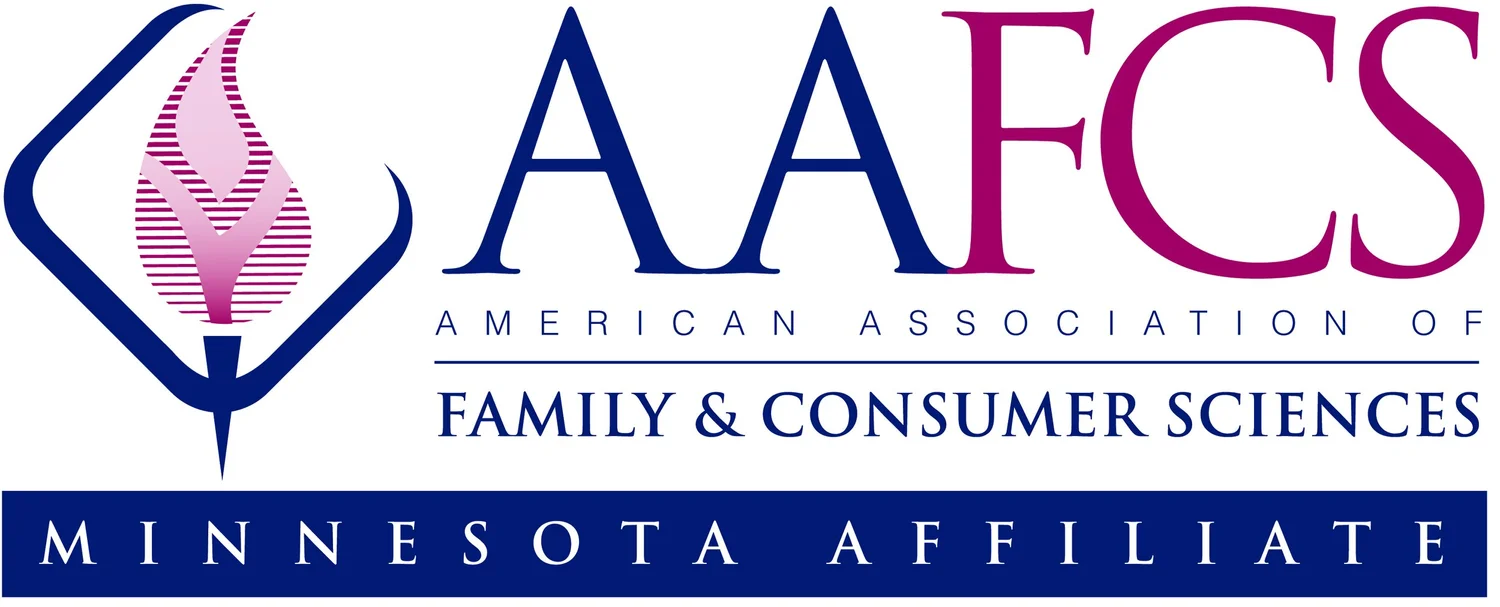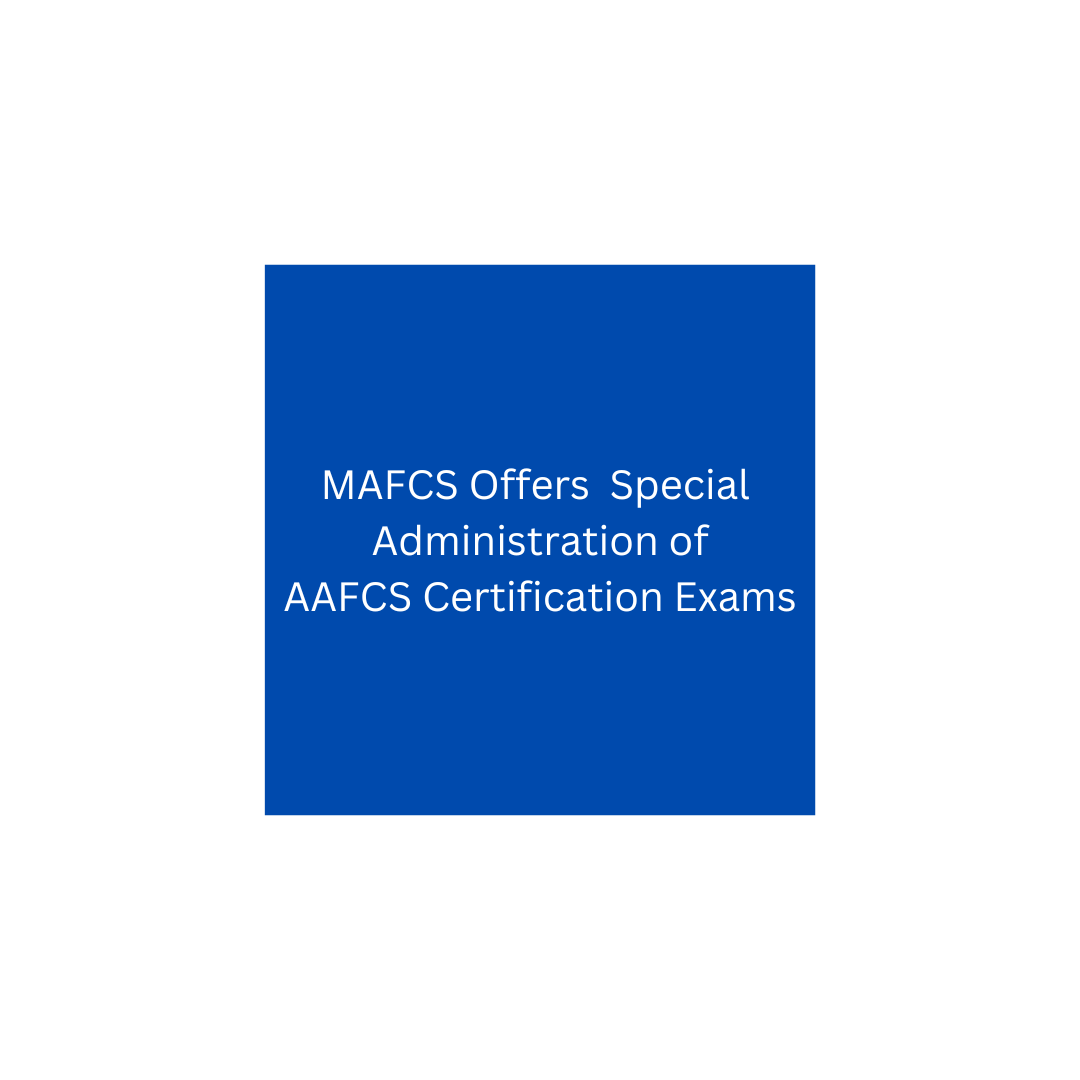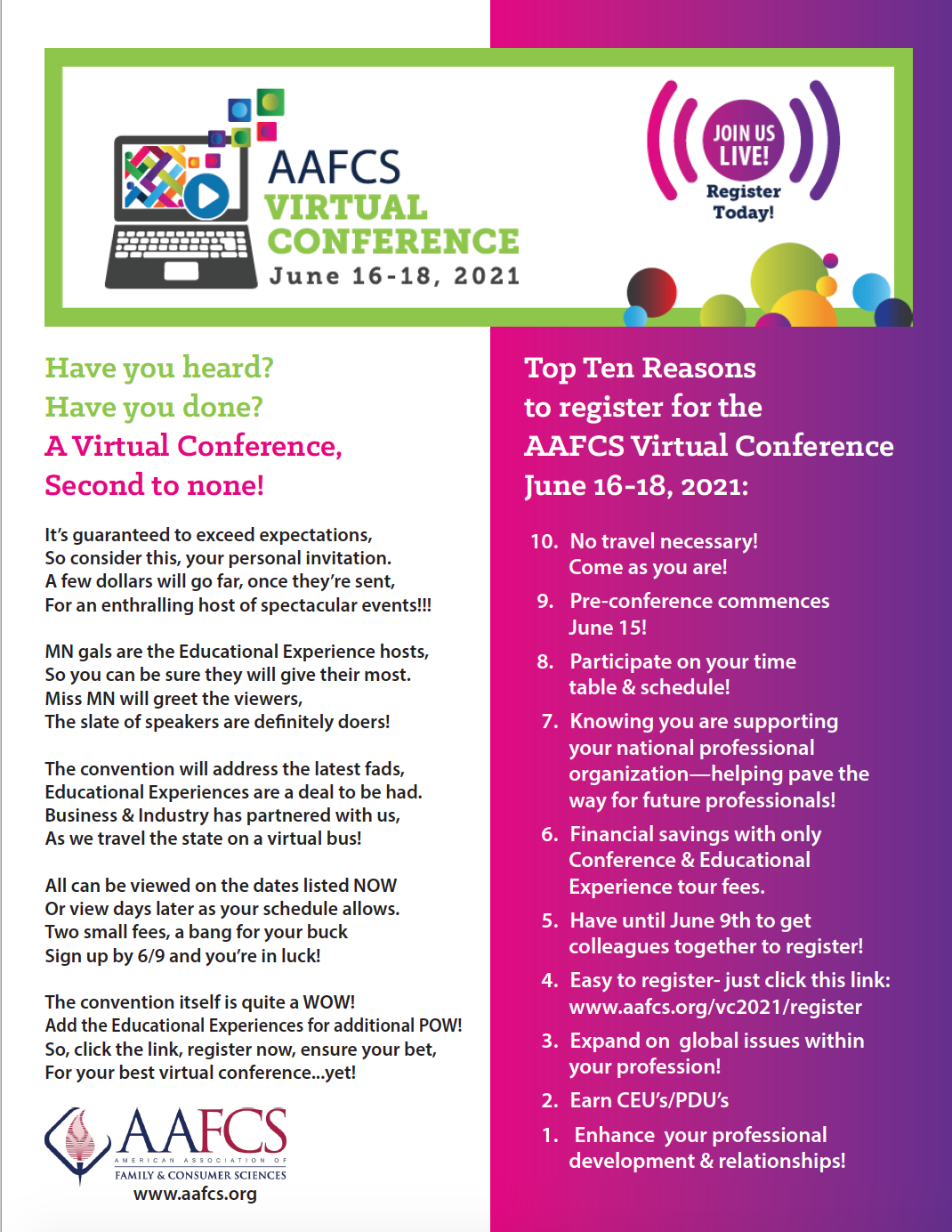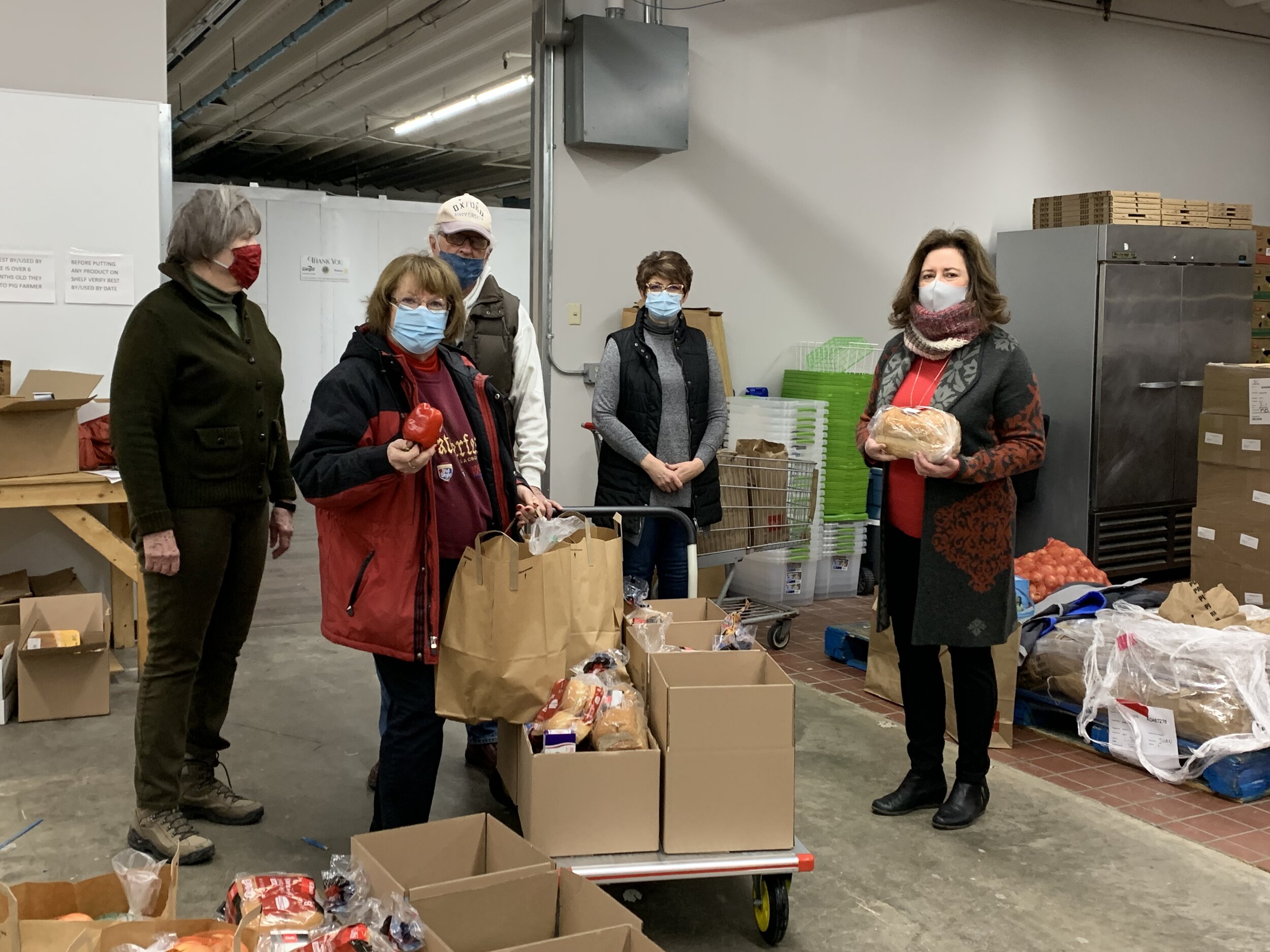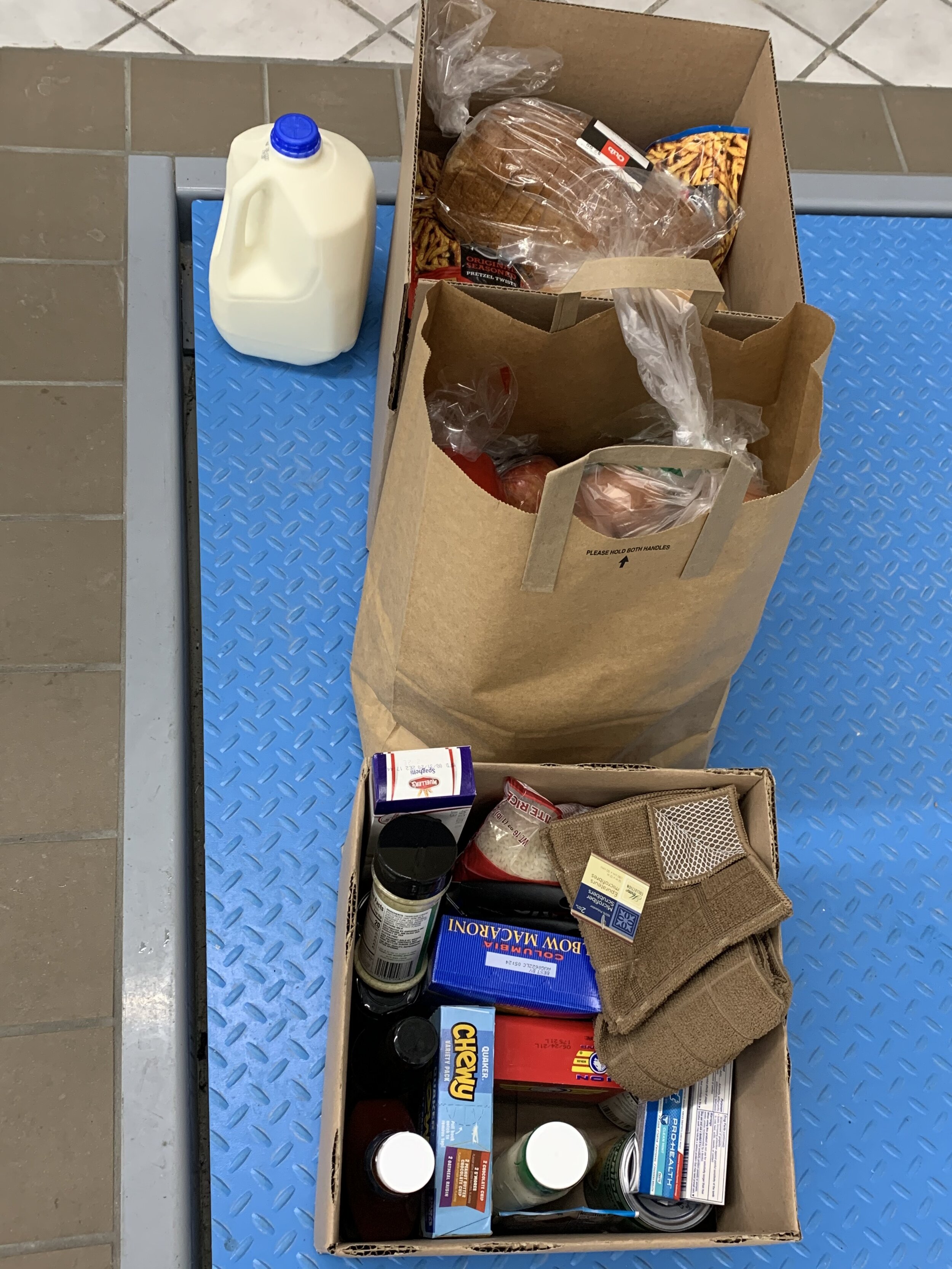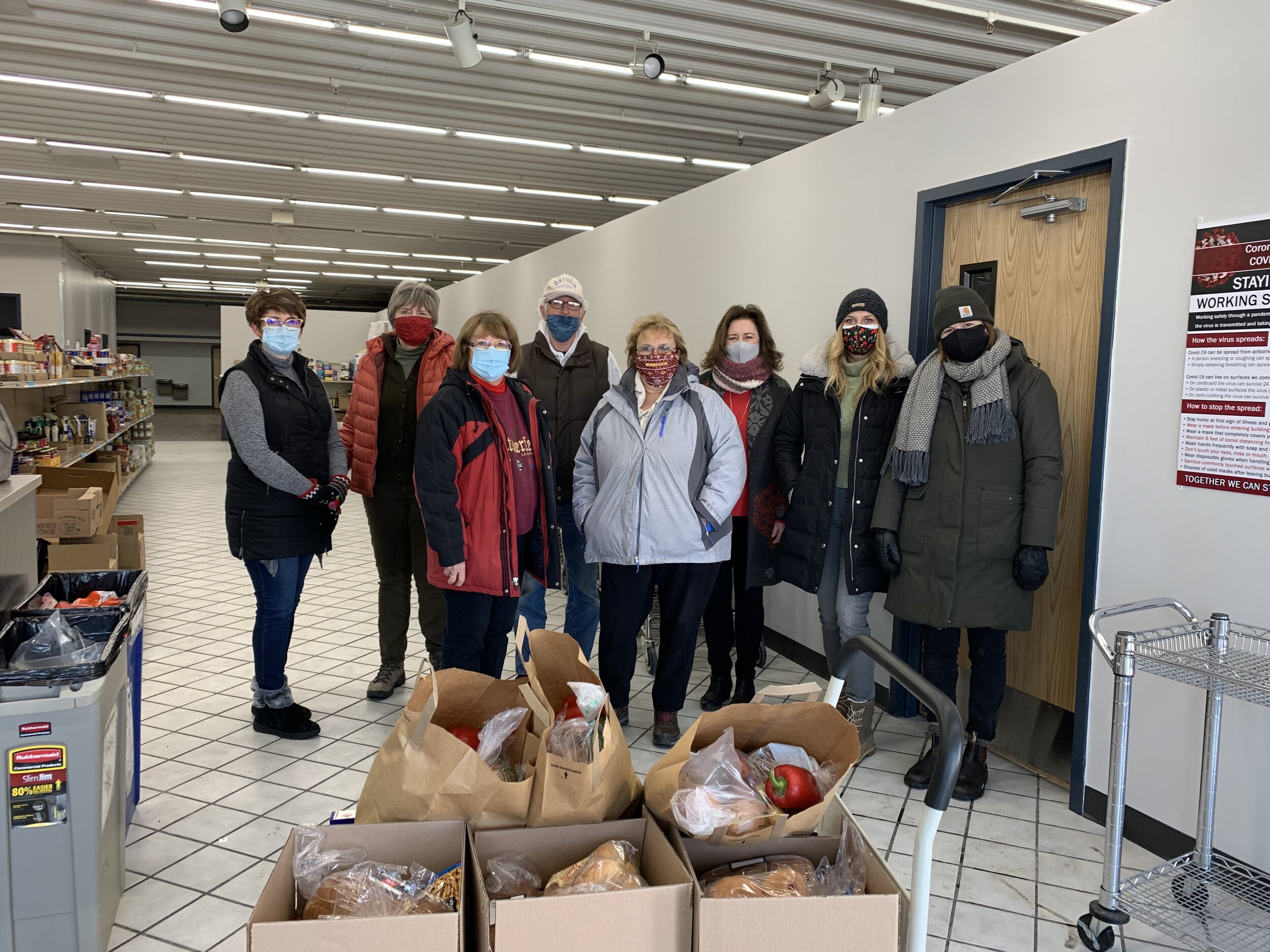APPLY BYAPRIL 15, 2024- FOR MORE INFORMATION AND APPLICATIONS - CLICK HERE
For More Information- Click Here
Minnesota Association of Family and Consumer Science
Announces
Special Administration of AAFCS Professional Certification Exams
WHO: Professionals who have a baccalaureate degree in any major or a university student within one year of graduation
WHEN: Friday, March 1, 2024
WHERE: Roseville Library, 2180 Hamline Ave N, Roseville, MN
REGISTRATION: Fee is $95 for this paper-and-pencil exam.
Registration opens February 1, 2024, and closes February 12, 2024.
Link to Online Test Registration Form: Click HERE to register
Individuals will be prompted to log into MyAAFCS to register – membership not required
All four exams can be administered during one testing date and time, but the participant can only take one of the exams at that time.
The AAFCS offers four gold-standard, competency-based assessments that are linked to AAFCS professional credentials
FCS Composite (CFCS- Certified in Family and Consumer Sciences)
HDFS (CFCS-HDFS- Certified in Human Development and Family Studies)
PFFE (CPFFE- Certified Personal and Family Finance Educator)
NEW (CNWE-Certified Nutrition and Wellness Educator)
HOW DOES A PROFESSIONAL EARN AND MAINTAIN AN AAFCS CREDENTIAL?
-Hold a baccalaureate degree in any major.
-Pass the competency exam associated with the credential (score at least 240 of 300).
-Meet fee and professional development requirements.
-Ascribe to the Professional Code of Ethics.
Learn more about AAFCS professional credentials:
www.aafcs.org/credentialing-center/professional-certifications
For more information about the sponsored administration, please contact:
MAFCS 2024 State Conference Committee: Cherry Cramer, cramercherry@gmail.com
2024 MAFCS TOY, NEW ACHIEVER, AWARDS, BEST PRACTICE GRANTS, SCHOLARSHIPS, HUGS/NPS DEADLINES EXTENDED TO DECEMBER 18, 2023!
2024 MAFCS Awards- Deadline extended to December 18, 2023. For Application CLICK HERE
2024 MAFCS Scholarships- Deadline extended to December 18, 2023. For Application CLICK HERE
2024 MAFCS Best Practice Grants- Deadline extended to December 18, 2023. For Application CLICK HERE
2024 Friend of MAFCS - Deadline extended to December 18, 2023. For Application CLICK HERE
2024 MAFCS HUGS Support- Deadline extended to December 18, 2023. For Application CLICK HERE
2024 MAFCS NPS Support- Deadline extended to December 18, 2023. For Application CLICK HERE
2024 MAFCS Teacher of the Year -Applications Closed for 2024. For Application CLICK HERE
2024 MAFCS New Achiever- Applications are closed for 2024. For Application CLICK HERE
Family and Consumer Sciences will be the featured education program at the Education Minnesota booth on August 25th. MAFCS members will be visiting with the attendees highlighting the FCS profession and classes in education. See you there!
MAFCS Teacher Jill Hanson has been chosen as a 2023 AAFCS Teacher of the Year Merit Finalist. Jill will represent Minnesota at the 2023 AAFCS Annual Conference in Baltimore, MD in June. Congratulations Jill!
2024 MINNESOTA TEACHER OF THE YEAR - Deadline September 25, 2023. For Application CLICK HERE
2024 MAFCS NEW ACHIEVER- Deadline October 1, 2023. For Application CLICK HERE
2024 MAFCS Awards - Deadline December 1, 2023. For Application CLICK HERE
2024 MAFCS Best Practice Grant - Deadline December 1, 2023. For Application CLICK HERE
2024 MAFCS Scholarships- Deadline December 1, 2023. For Application CLICK HERE
2024 HUGS Support- Deadline December 1, 2023. For Application CLICK HERE
2024 NPS Application- Deadline December 1, 2023. For Application CLICK HERE
MAFCS at The State Fair
VISIT MAFCS at the Education Minnesota State Fair Booth. On August 25th, we have a booth at the State Fair to showcase MAFCS and need volunteers to work. The booth is open from 9am-9pm. MAFCS members will be highlighting the FCS profession and FCS education programs in Minnesota. See you there!
Contact Mia Battistone for more information at mia.battistone@district196.org
New Standards for Personal Financial Education are Released
MAFCS PUBLIC POLICY is pleased to announce that Jump$tart and the Council for Economic Education have collaborated on a single, unified set of standards that will guide educators, curriculum writers, policymakers, and other financial education stakeholders across the country to promote effective, comprehensive financial education for K-12 students.
The new national Standards reflect the evolution of financial services, current approaches to financial education, and a more intentional inclusiveness of all users. MAFCS passed a resolution on Financial Literacy in 2020; work with legislators is an on-going endeavor. Please review the New Standards link in the PDF file that can be accessed here https://tinyurl.com/4xtzpcht .
Congratulations to Gretchen Lee, the 2022 Minnesota Association of Family and Consumer Sciences teacher of the year!
Gretchen teaches FCS in Badger, ISD #676. She received her secondary education degree with a BA from Central Michigan University. Upon moving to Minnesota, she earned her BS degree for Family and Consumer Sciences from North Dakota State University. Gretchen says being a teacher is her dream job! She believes in respect, rigor, and rapport with her students. Along with teaching FCS, she has an active FCCLA chapter, is the Student Council Adviser, she co-teaches the night -time Early Childhood Family Education program and belongs to the Pine to Prairie Career and Technical Consortium. She’s a member of the school’s Student Assistance Team and Wellness Committee. In 2016, Gretchen received the Kramer Brown Teacher Recognition Award as an exemplary teacher educator. Her superintendent/principal shared that Gretchen’s diverse work and life experiences has enhanced the students learning at their school. Gretchen has strong connections with students, colleagues, and community member!
To read more about her award, please visit our website.
April 15 the MN ProStart Invitational was held at Grandview Lodge in Nisswa. The Sauk Rapids-Rice Culinary and Management Teams represented SRRHS with great professionalism and pride. The results are that SRRHS won back to back state championships in Culinary and in Management.
The team also won "The Essence of Taste" and "Teamwork" Award.
Samah Tariq won a knife kit for the best knife skills in the competition.
Members of this year's team are: Eli Rudnick, Samah Tariq, Chelsey Vogel, Noah Rosenberger, Faith Munson and Kavan Gaullete.



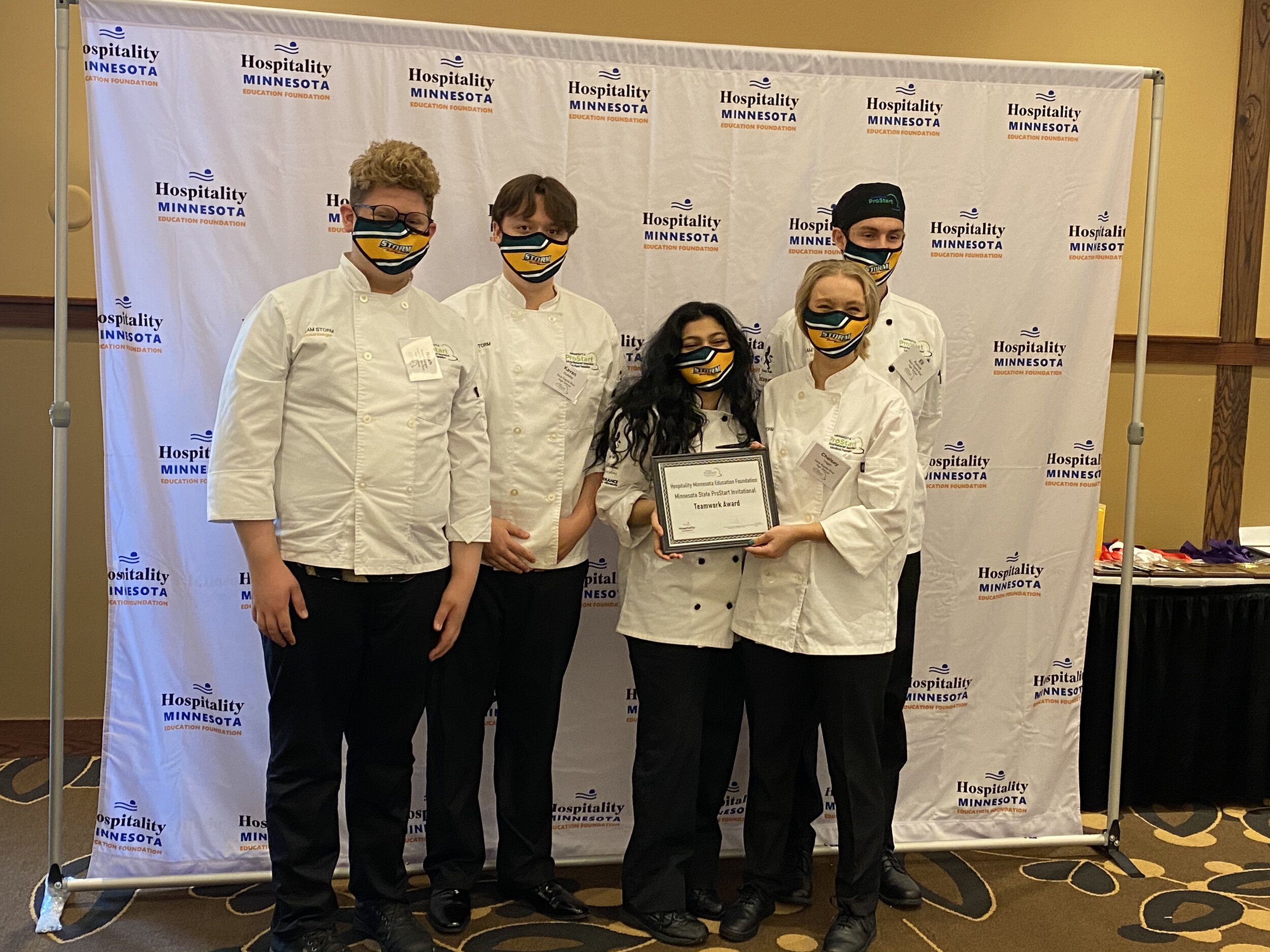
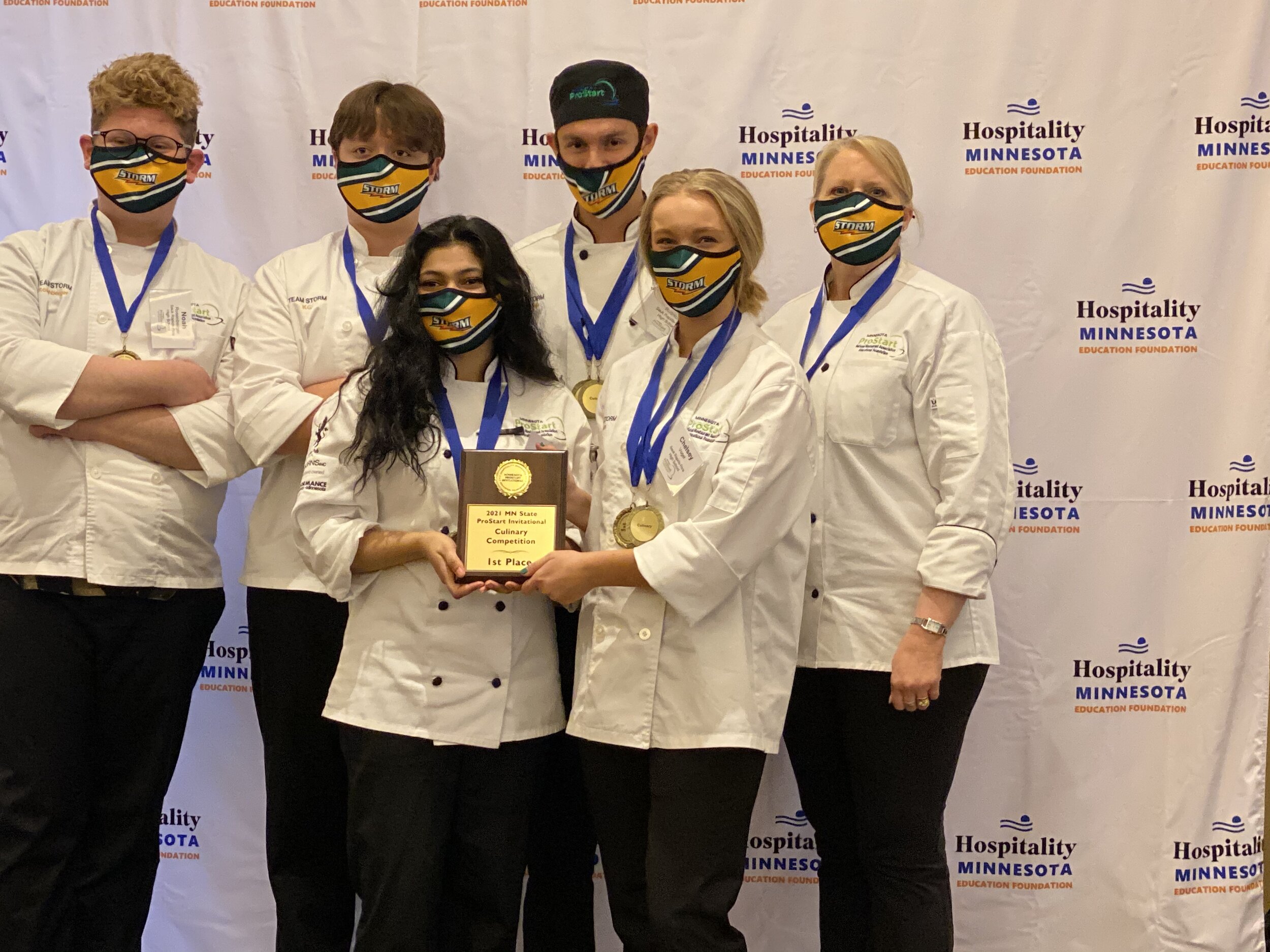
Submitted by Mary Levinski
This week both the House and Senate advanced their respective education omnibus appropriations bills – HF1065 and SF960. HF1065 was heard in the House Tax Committee and the House Ways and Means Committee and will be voted on by the full House on Monday, April 19. SF960 advanced out of Senate Tax committee but is awaiting review by the Senate Finance committee before being voted on by the full Senate sometime next week. Then the conference committee process begins.
Bill summaries
Below are summaries of the House and Senate education omnibus bills as well as education related provisions in other bills.
Senate advances bill directing use of federal funds
On Friday, the Senate Finance Committee discussed a bill outlining their priorities for the use of federal funding Minnesota is expected to receive under the portion of the American Rescue Plan. Minnesota will receive $2.57 billion allocation as part of the State Fiscal Relief Fund and has discretion on the use of these funds.
The proposal directs funding for a number of areas included K12 education -- $100 million is appropriated to address the special education cross subsidy.
MN Management and Budget (MMB) cautioned on moving too quickly and indicated some of the uses outlined in the bill may not be allowed. MMB is still waiting for guidance from the federal government on the use of these funds and asked for a slowing down in advancing this legislation. The House is unlikely to advance a similar proposal but expect overall negotiations on the state budget to include discussion on the use of these federal funds.
The committee did not act on the bill but likely will in the coming weeks.
Next steps
We will be sending a call to action about final negotiations on the education finance bill. We are letting the work of the legislature progress right now and will let you know the right time to engage on funding priorities and which members we need you to reach out to. In the meantime, please do the following:
Thank Rep. Jim Davnie (rep.jim.davnie@house.mn) for the strong support and funding in the House bill.
Communicate with your local legislators to let them know how the funding proposals in each bill would impact your school district.
The MAFCS, TCHC, and FCSP Joint Meeting will be held on Thursday, April 8th via Zoom. Plan to attend this stimulating and educational professional development opportunity. We are excited to have Dr. Julie Jones and Dr. Sujaya Rao as our guest speakers for the evening. PDU and CEU credits will be offered.
As a 2020-21 FACS member, attending is a membership benefit and complimentary. Invite colleagues or friends that would find the presentations interesting and the Joint Food Insecurity Project inspirational. Guest attendance is complimentary.
A zoom link for the meeting will be sent out to all members on Tuesday, April 6th.
Schedule
4:35 - 4:45 pm Sign into Zoom
4:45 - 4:55 pm Summary of FCS Action Minnesota Food Insecurity Project
4:55 - 5:00 pm 2021 MAFCS Outstanding Service Award Presentation
5:00 - 6:00 pm Julie Jones, Just the Facts, Ma’am - Food Fictions, Frauds, Factoids, Fallacies, and Fake News
6:00 - 6:10 pm Stretch break and time to grab a beverage or snack
6:10 - 6:15 pm Introduction of organizations
6:15 - 7:15 pm Sujaya Rao, Edible Insects: Food Security, Environmental Stewardship, Business Opportunities
7:15 pm Acknowledgements and Announcements
The members of MAFCS, TCHC and FCSP are working together to make a great impact across our state from the Twin Cities area to International Falls. Becky Bergmann, a member of all three organizations, shares this update:
It started with an idea and a bucket and grew to over 50 pounds of food and supplies for a family. Three organizations came together for a common cause – food insecurity. And, thanks to everyone in these professional groups, it has, so far, been a resounding success.
Spearheaded by three presidents, MAFCS, TCHC, AND FCSP developed a project, FCS Action, to help families in three areas of the state. Though the goal has been to get food into the hands of those that most desperately need it, as professionals in human ecology, they wanted to give more. Food shelf sources said education was needed as well as recipes for guidance. It was impossible to do in-person demonstrations due to COVID, so resources were collected, recipes developed and printed in a book, as well as handouts with pictures, and a booklet called “Power Up Supper Recipes and Nutrition.” A video was also produced that featured two FACS teachers demonstrating the recipes. A link was sent to each family for viewing.
On January 30th, members for all three organizations, arrived in Monticello and organized and boxed up foods and supplies for 25 families. The Help Center of Monticello hosted us and gave quite a few additional items for our project. In FCS fashion everyone got right to work getting organized and systematically putting the items together. I think some moved at the speed of light. By the time we were finished we had a CUB box and grocery bag brimming with foods, the bucket (also filled), and a gallon of milk for each recipient. All of us were masked up and did practice social distancing.
For the Monticello portion of this project, a survey was taken, sponsored by the American Heart Association. They provided grant money to help in this project also. All recipients stayed in their cars and our members came to them. Thankfully it was a really pleasant morning outside. Karen Smith and Kathy Norquist problem solved along the way, especially when a few families didn’t show up. All the food was given out by the end of the morning.
On February 20th, the families had a second opportunity to receive food and supplies. The Heart Association wanted portions of the survey repeated as a follow-up. We also provided an incentive for each family. They got a CUB gift card to go with new recipes and over 60 pounds of food.
The stories and hardships of these families are invisible until you get to be there 1:1. It helped me get a better understanding of the many faces of food insecurity. And then to think that this is one small community in one state in one country. It feels overwhelming. But I was so happy that I was able to participate in this project and that our members were reaching out in any way that they could.
Thank you so much to Karen Smith, Kathy Norquist and Lois Lewis for their leadership and hard work in this collaboration. A special thank you goes to Lars Carlson of the Monticello Help Center, Maree Smith for acting as interpreter for the Spanish speaking families, as well as Karen’s and Kathy’s husbands for their help in packing, loading, and delivering the items.
Join Us for ACTE's Virtual National Policy Seminar Orientation
All welcome: free to registered attendees & to those considering attending
Feb. 8 at 3:00 p.m. ET
Career and technical education (CTE) professionals will have the opportunity to engage virtually on key education policy topics, hear best practices for influencing federal policy related to CTE advocacy and messaging, and participate in virtual Capitol Hill and school visits during ACTE's virtual National Policy Seminar (NPS), happening the week of Feb. 22. ACTE's culminating awareness-building event of this year's CTE Month®, NPS will feature a discussion of the new Administration's priorities.
For a sneak preview of NPS, ACTE invites both registered attendees and anyone wishing to learn more about the event to join us for a virtual orientation on Feb. 8, 3:00-4:00 p.m. ET. During this live webinar, which will also be recorded and made available for viewing at your convenience, ACTE's public policy staff will cover everything you need to know to make the most of your participation in this year’s virtual event, including:
An overview of the event agenda and speakers
How to navigate the NPS attendee website and use the materials included to prepare for the event
The process of scheduling virtual “Hill” meetings with your federal policymakers
Tips for conducting virtual meetings and other basic advocacy strategies
There will also be plenty of time for Q and A and discussion, so we hope you can join us!
Join Zoom Meeting on Feb. 8 at 3:00 p.m. ET
Meeting ID: 949 8132 0225
Passcode: NPS2021
One tap mobile
+13017158592, 94981320225# US (Washington DC)
+13126266799, 94981320225# US (Chicago)
Dial by your location
+1 301 715 8592 US (Washington DC)
+1 312 626 6799 US (Chicago)
+1 646 558 8656 US (New York)
+1 253 215 8782 US (Tacoma)
+1 346 248 7799 US (Houston)
+1 669 900 9128 US (San Jose)
Celebrate CTE Month
Join us this month to spread awareness about the importance of CTE for our students and our nation’s economy with some of these outreach opportunities:
Share our social media messages on ACTE's Twitter or Facebook or share your own success stories on social media using #CTEMonth.
Learn more about the esteemed Career and Technical Student Organizations (CTSO) by visiting our CTSO Showcase. CTSOs offer students innovative programming, authentic leadership experiences and business and community opportunities at the school, state and national levels.
Gear up with festive CTE Month merchandise to show your support for CTE.
Encourage your students to participate in the CTE Month-NASA HUNCH student video challenge, “Advancing Space Exploration Through Manufacturing.”
Download the CTE Month logo for use with any of your print and digital outreach.
FCS Division Members,
December was a blur with ACTE's Virtual VISION and then the holidays. I hope you had some time to reconnect with your family and get some rest! I have a few specific items for you regarding FCS and then several for the general ACTE community. Please take care of yourself and best wishes for a wonderful spring semester.
Celebrate CTE in February
Don’t forget that February is CTE Month, and the second week of February is FCCLA week and the Wednesday of that week is FCS Ed Day! Please take the time to visit www.fcsed.net to find resources for this week and encourage your students to start the path to become an FCS teacher.
Baking Just Got Better
Have you checked out the resources from the Home Baking Association? This organization is an active friend to FCS and part of the Alliance for FCS. They not only provide resources regarding “home” baking but also for careers surrounding the activity.
ACTE has designed special Zoom meeting virtual backgrounds for each ACTE division and region. Note the new FCS Division logo that aligns with the FCS national brand! Click the image to download yours today!
ACTE Announces Board of Directors 2021 Election Results
ACTE is pleased to announce the results of the recent election for several spots on its Board of Directors. The election was open to ACTE’s membership of roughly 25,000 educators, administrators and other career and technical education (CTE) professionals. The following members were elected:
Scott Stone, President-elect
Shani Watkins, Region V Vice President
Robert Torres, Agricultural Education Division Vice President
Holly Strand-Rysgaard, Health Science Education Division Vice President
Beth Parks, Region II Vice President-elect
Brandon Russell, Region III Vice President-elect
Susan Leon, New and Related Services Division Vice President-elect
Influence CTE Federal Policy Priorities at NPS!
Voice your CTE needs to help shape education policy priorities under the new administration, learn about strategies for influencing federal policy related to CTE advocacy and messaging, and participate in virtual Capitol Hill and school visits. Happening the week of Feb. 22, in concert with your CTE Month awareness-building activities, ACTE’s virtual National Policy Seminar 2021 will feature an official welcome from the new administration.
Missed Virtual VISION 2020?
ACTE’s CareerTech Virtual VISION 2020 featured live keynote presentations and hundreds of sessions, covering CTE innovations, timely topics and specific CTE subject-matter areas. Conference materials and sessions are now available for 24/7 on-demand viewing at your convenience at regular attendee rates. Enjoy premier professional development via full access to all Virtual VISION sessions! Register now
Mark your calendars for VISION 2021, a hybrid event with programming available online and on-site, Dec. 1–4 in New Orleans, Louisiana. Call for presentation proposals will open in February.
New CTE Learning Webinar Series
Beginning this month, join us as we showcase some of the best professional learning opportunities for CTE personnel. Each free webinar is 30 minutes and will feature experts covering topics, such as professional learning communities, developing employability skills in CTE and more.
Raise Awareness for CTE
Join us in February to celebrate and spread awareness about the importance of CTE for our students and our nation’s economy with several outreach opportunities:
Encourage your students to participate in this year’s CTE Month-NASA HUNCH student video challenge, “Advancing Space Exploration Through Manufacturing.” The deadline to submit videos is April 1.
Share our social media messages all month long or your own success stories on social media via #CTEMonth.
Gear up with festive CTE Month merchandise at shopacte.com to show your support for CTE.
Advocate for CTE — use ACTE tools to assist you in your advocacy activities, keep you informed and promote ongoing support for CTE.
Download the CTE Month logo for use with any of your print and digital outreach.
New Hybrid Work-based Learning Conference
Learn about best practices in work-based learning from across the country at ACTE’s National & Iowa’s Annual Hybrid Work-based Learning Conference, which will offer on-site and online programming. Interested in presenting? Submit your presentation proposal by Feb. 5 for consideration.
Apply for ACTE’s Achieve 100 Award
Showcase your institution's dedication and commitment to CTE! Schools and institutions that achieve 100% ACTE membership across their CTE staff and faculty will receive this distinguished award. Complete the online application by Feb. 1 to participate and recognize your educators!
Year in Review 2020
As 2020 ends, there has been a flurry of last-minute federal activity. While the Year-in-Review Legislative Update below will provide a broad overview of this year's policy actions impacting CTE, we wanted to also draw your attention to two significant pieces of news that have occurred this week, including the agreement in Congress on a COVID-19 relief and FY 21 appropriations bill, and the announcement of the secretary of education nominee from President-elect Biden. You can visit the two blog posts below for more details on those major news items, and keep reading for a full recap of the year!
Federal Funding
The FY 2021 budget and appropriations process began on February 10 with the release of President Trump’s budget request to Congress. The President’s budget request, which is non-binding, outlined the Administration's spending priorities for FY 2021, which runs from October 1, 2020, through September 30, 2021. The Trump budget proposal included a $680 million, or 53%, increase for the Perkins Basic State Grant program, bringing the proposed FY 2021 total to $1.963 billion.
The budget proposal also recommended $90 million for Perkins National Programs, $83 million above the FY 2020 level, for competitive grant funds that would have supported a small number of CTE programs in STEM fields. Further, the budget included over $100 million in additional funds that could be generated for Perkins through changes to the H-1B visa program. However, the proposed increases for Perkins were coupled with sharp cuts to education and workforce programs overall, making it difficult for Congress to follow through on these large increases.
This spring, lawmakers had an opportunity to sign letters in support of Perkins funding for FY 2021. Sen. Richard Blumenthal (D-CT) in the Senate, and Reps. Glenn Thompson (R-PA) and Jim Langevin (D-RI) in the House of Representatives again led the effort. These letters received enormous support on Capitol Hill—a record setting 182 bipartisan members of the House and dozens in the Senate championed federal funding for CTE.
With COVID-19 disrupting the normal appropriations process, the next step happened over the summer, when the House Labor, Health and Human Services, and Education Appropriations subcommittee released its bill, which provided an additional $18 million, or 1.4%, to the Basic State Grant program. The full House passed the bill, with this funding increase, later in the summer.
While the House passed the majority of their funding bills, the process stalled in the Senate due to a variety of reasons, but mainly the effort to focus on COVID-19 relief. Running into the September 30 fiscal deadline, the House and Senate passed a ten-week CR that extended funding through December 11 at FY 2020 levels in order to give congressional leadership more time to hash out their funding differences.
Finally, in late fall Senate Labor, Health and Human Services, and Education Appropriations Subcommittee Chair Roy Blunt (R-MO), released the text for the Senate appropriations bill. This bill marginally increased funding for the Department of Education, while providing a $75 million increase to the Perkins Basic State Grant! None of the 12 Senate appropriations bills were taken up in committee however, instead they were used as starting points for negotiations with House Democrats.
This winter, Congress passed multiple short-term CR’s to give them more time to reach consensus on year-long FY 2021 spending levels. Ultimately, Congress passed a full-year omnibus bill including appropriations for all federal programs. The bill included a $52.25 million increase for the Perkins Basic State Grant, bringing the new total to $1.334 billion. This increase serves as the fourth straight for the Perkins Basic State Grant, which provides a strong indication of the growing support for CTE on Capitol Hill!
The final bill is still awaiting the president's signature, and there has been some concern that he may veto it, so this may not be the end of the appropriations saga yet!
COVID-19 Pandemic
Back in early spring, the COVID-19 pandemic began to bring about monumental change to our lives that we continue to see today. Shortly after the pandemic began, Congress passed the Coronavirus Preparedness and Response Supplemental Appropriations Act of 2020 and the Families First Coronavirus Response Act within weeks of each other. Both of these proposals heavily focused on small business relief and health-related provisions, such as research, testing, and prevention measures. Although there were some child nutrition provisions in the latter, neither included direct funding for education. To round out action in early spring, Congress passed the Coronavirus Aid, Relief, and Economic Security Act (CARES), which included almost $40 billion for education.
Although Congress did not pass any additional relief packages that included education funding between late spring and the fall, the education committees stayed busy by holding numerous hearings and member briefings on various COVID-19 related topics, ranging from going back to college safely and safely reopening k-12 schools, to assessing the impact of COVID-19 on public education and relaunching America’s workforce in the aftermath of the pandemic, among other topics. Throughout the year, Congress continued to remain in negotiations on additional pandemic-related relief but was not able to come to agreement.
Aside from the handful of comprehensive COVID-19 relief bills that have passed, there were many others that were introduced by both parties and generally used in negotiations throughout various parts of the process. These proposals include the Relaunching America’s Workforce Act, which would have provided Perkins with $1 billion in dedicated funding; and the HEALS Act, which was Senate Republicans' counter bill to House Democrats' HEROES Act. Another proposal worth noting was the Coronavirus Child Care and Education Relief Act, which included $430 billion for various education and childcare programs and initiatives.
With only days remaining in 2020, Congress finally passed an additional relief proposal by coupling it with the FY 2021 omnibus appropriations bill discussed above. In this $900 billion bill, the Department of Education will receive $82 billion for the Education Stabilization Fund. Out of that funding, $54.3 billion is for K-12 (Elementary and Secondary School Emergency Relief fund), which can be used for a variety of activities, including school facilities repairs and improvements and addressing learning loss among students. CTE activities eligible to be funded under Perkins are also included. Higher education will receive $22.7 billion, while the Governor’s Emergency Education Relief fund will receive an additional $4.1 billion. Notably left out of the proposal was the extension on the pause of federal student loan repayments. This bill now awaits the president's signature, but as of December 23, it is unclear whether he will sign it into law or if additional changes will have to be made.
Throughout the year, ACTE worked closely with Congress and the Administration to advocate on behalf of CTE programs to ensure they receive the resources and flexibilities needed to navigate the pandemic. Over the course of the year, we wrote letters to both Congressional leadership and the Administration on topics including our concerns for CTE programs, COVID-19 Policy Priorities, concerns regarding student aid exclusions, and response to the HEROES Act; among many cross-organizational letters laying out other funding and policy priorities. Further, we actively worked with congressional appropriators to provide adequate funding for state and local aid, and more specifically, dedicated funding for CTE and other workforce programs.
Perkins Implementation
As 2020 began, states were busy working to finalize their Perkins V state plans for submission to the Department of Education (ED) by the original April 15, 2020 deadline. However, due to the impact of the pandemic, ED released guidance in late March allowing an extension of this original deadline, and states submitted their plans throughout the spring and early summer. ED approved these plans on a rolling basis, and by August, had approved plans for all 50 states plus a number of territories. Since then, states have been working to implement pieces of their plans. In most places, local Perkins recipients also spent the spring and summer finishing up their Comprehensive Local Needs Assessments and Perkins V Local Applications to submit to their state agencies, and despite COVID-19, this school year marks the first full year of implementation of all the provisions of Perkins V.
Higher Education Act Reauthorization
The reauthorization of the Higher Education Act (HEA) saw a lot of activity in 2019 and was the top education-related priority for Congress heading into 2020. Unfortunately, progress largely stalled due to the pandemic and other related issues.
In the House, Democrats passed their comprehensive HEA reauthorization bill, which included a number of ACTE priorities, out of Committee on a party-line vote at the end of 2019, but it was not brought to the House floor in the new year. In the Senate, negotiations all but stopped between the Committee’s Republican Chairman Lamar Alexander (R-TN) and Ranking Member Patty Murray (D-WA), and they were unable to come to agreement on numerous contentious items, including Title IX and program accountability provisions. With COVID-19 taking center stage, the education committees instead shifted to focus on ensuring educational institutions had the necessary resources to continue providing high-quality instruction to their students in a safe manner.
At the very end of the year, there were a few Higher Education Act-related provisions included in the omnibus bill, including FAFSA simplification and removal of the ban on financial aid for incarcerated students.
Congressional CTE Caucus
ACTE worked closely with the caucuses in 2020 to keep congressional staff up-to-date on CTE issues by helping to facilitate briefings and advancing federal CTE policy. Due to the pandemic, the CTE Caucus only hosted one briefing in August, which dealt with how CTE programs were being affected by the pandemic.
The Caucus also spearheaded efforts to boost Perkins funding and promote CTE Month through “Dear Colleague” letters. In total, there were 125 signors on the CTE Month letter (57 senators and 68 representatives), beating the totals in both chambers in 2019. Further, a record number of members signed onto the FY 2021 Perkins Basic State Grant funding letters. Additionally, the size of both the House and Senate caucuses grew in 2020 to all-time highs, compromising almost a quarter of the entire Congress. ACTE also worked closely with the CTE Caucus on a letter, led by House Co-Chairs Reps. Jim Langevin (D-RI) and G.T. Thompson (R-PA), advocating for $1 billion in dedicated funding for CTE in the face of the pandemic.
Administration Activity
The Administration’s efforts related to CTE were largely focused on COVID-19 and providing waivers, flexibilities and funding guidance to schools this year. In the spring, the Office of Career, Adult, and Technical Education (OCTAE) released a pair of FAQs (March 31, April 10) related to Perkins and COVID-19. Other major actions related to CTE and the coronavirus included a memo outlining answers to a series of critical questions related to the use of federal education grant funds; an announcement stating that CTE programs may donate or loan medical supplies and personal protective equipment (PPE) in support of the fight against the coronavirus; and a report to Congress from Education Secretary Betsy DeVos with recommended waiver authority for Perkins, among other statues.
Over the summer, Secretary DeVos announced the Reimagine Workforce Preparation Grant program, designed to provide students the opportunity to develop new skills, provide innovators and inventors the resources to expand existing businesses or build new ones, and encourage institutions of higher education to foster business development and innovation as America begins to recover from COVID-19-related disruptions to education and our economy.
There were a few other key activities that the Administration took not related to COVID-19, including a final rule in June updating the regulations that govern distance education in higher education, and OCTAE’s December "Request of Information" seeking input on successful approaches to expanding work-based learning (WBL) opportunities. Additionally, in June, President Trump signed an executive order extending the National Council for the American Worker and the American Workforce Policy Advisory Board’s authority through September 30, 2021.
Other Issues
ACTE continued to work closely with Democratic and Republican offices in the House and Senate on a variety of other issues. From boosting the infrastructure workforce, to legislation supporting the expansion of broadband and the reauthorization of the National Apprenticeship Act, ACTE continued to advocate for CTE professionals and students.
2020 Elections
The 2020 election saw the highest voter turnout, as a share of the voting-eligible population, since the 1908 election. After almost a week of counting votes, former Vice President Joe Biden cleared the 270 electoral college vote threshold to become the 46th president of the United States. President-elect Biden ended up with 306 electoral college votes to President Trump’s 232 votes. On December 22, President-elect Biden announced Miguel Cardona, Connecticut’s education commissioner, as his nominee for secretary of education. After the election, ACTE released CTE policy recommendations for the incoming Administration, accompanied by a letter laying out qualifications we hope the next Assistant Secretary of Career, Adult, and Technical Education possesses.
With all but one race called in the House of Representatives, the Democrats will head into the 117th Congress retaining their majority. The Republicans have shrunk the Democratic majority to 222-212 potentially making certain policy priorities more difficult to accomplish. Additionally, certain member retirements have led to changes in committee leadership positions critical to CTE. Rep. Susan Davis (D-CA), Chairwoman of the Higher Education and Workforce Investment Subcommittee, which oversees postsecondary CTE legislation, has retired. In terms of seniority, Joe Courtney (D-CT) or Mark Takano (D-CA) are likely to succeed her as Chair. Another important retirement is Rep. Nita Lowey (D-NY), who is currently the Chairwoman of the Appropriations Committee. Labor, Health and Human Services and Education Appropriations Subcommittee Chairwoman Rosa DeLauro (D-CT) was elected by her peers to replace Rep. Lowey as the full committee chair, which bodes well for education funding.
On the Senate side, control of the majority is still unclear, although the odds are in favor of Republicans remaining in control of the upper chamber. Currently, Democrats have netted one seat and the chamber sits at a 50-48 advantage for Republicans. Two races in Georgia have yet to be decided, having to go to a January 5th runoff since no candidate met the 50% vote threshold required in that state. If the Republicans do retain the majority, it is all but certain that Sen. Mitch McConnell will continue as majority leader. Like in the House, a major retirement announcement is set to shake up committee leadership in the Senate Health, Education, Labor and Pensions Committee. Long time chairman, Sen. Lamar Alexander (R-TN) will be retiring at the end of the 116th Congress. It is expected that either Sen. Richard Burr (R-NC) or Sen. Rand Paul (R-KY) will replace him in the chairman role.
Top 10 Blog Posts of 2020
ED Chairman Scott Introduces Relaunching America's Workforce Act
Sec. DeVos Testifies at House Hearing on FY21 Budget Request
Broadening the Path: Design Principles for Middle Grades CTE
House Democrats Release HEROES Act; $3 Trillion Coronavirus Relief Package
New ED Competitive Grant Opportunities to ‘Rethink’ Learning During Pandemic
Looking Ahead to 2021
With a new Administration and a divided Congress, which has historically led to gridlock, the Biden Administration’s actual agenda will likely be nowhere nearly as expansive as his campaign platform. If the Senate remains with a Republican majority, President-elect Biden may be forced to try and achieve his agenda through regulatory moves and executive actions. Whether there will be a bipartisan appetite to pass legislation is still yet to be seen, but it does not lessen the number of important issues that will face Congress; including COVID-19 relief; the reauthorizations of the Higher Education Act (HEA) and the Workforce Innovation and Opportunity Act (WIOA); and infrastructure investments; among other critical issues.
The start of the FY 2022 budget cycle will begin in earnest with the release of the Administration’s budget request in February. President-elect Biden has indicated throughout his campaign that his Administration will seek to prioritize and invest heavily into our nation’s education and workforce systems. From there, Congress will have to work through another politically challenging appropriations process.
The reauthorization of HEA will likely continue to be a priority for both the House and Senate education committees heading into the new Congress. In the House, the Democrat HEA reauthorization plan, the College Affordability Act, will likely be the Democrats starting point for negotiations. The major themes of the legislation include lowering the cost of college, improving the quality of higher education and expanding opportunity for students of all backgrounds to succeed. With Republicans likely to hold a slight majority in the Senate, the HELP committee will again try to create a bipartisan HEA bill in hopes of gaining support from both sides of the aisle. However, this process is likely to be complicated, as the parties differ on key provisions.
More broadly speaking, there is still an interest across party lines to pursue some form of a federal infrastructure package, especially in light of the current economic recession, because of its ability to create jobs and stimulate the economy. Any package could include additional funding for CTE and workforce training programs that support infrastructure-related career fields. Further, the reauthorization of WIOA will be another opportunity to heal the partisan divide and allow members to work across the aisle in order to bolster our nation’s workforce systems.
As you can tell, Congress will be working on a handful of issues important to the CTE community. That is why it is important that we continue to advocate for a strong federal investment for CTE in the new year. Help to amplify CTE by joining us virtually the week of February 22 for ACTE’s 2021 National Policy Seminar!
Your ACTE membership and dues directly impact our ability to serve as your advocate for CTE programs on Capitol Hill, and our efforts would not be possible without your support. Learn more about ACTE’s policy activities and the latest news on ACTE’s CTE Policy Watch blog. If you have any questions, please contact the ACTE Public Policy Department.
Association for Career and Technical Education. 1410 King Street, Alexandria, VA 22314
800-826-9972 | Unsubscribe | Opt Out | publicpolicy@acteonline.org | ACTE Policy website
Introducing the Online Learning Resource Center (OLRC) for Career and Technical Education, a collaboration between the Minnesota State Career and Technical Education office, the eight Minnesota State Centers of Excellence, and the Minnesota Department of Education.
OLRC is a consolidated source of instructional materials to help secondary and postsecondary educators adapt to the need for ongoing remote or blended instruction. The resources in OLRC have been curated by educators and are free for educators to browse and use. Curation was performed using a selection criteria rubric, and content in OLRC is monitored and updated regularly to ensure its relevance and usefulness.
OLRC is a response to the unique needs of career and technical education teachers and faculty across Minnesota.
What resources do educators need to help them be better online learning teachers?
What off-the-shelf, free resources are available for them to include in their courses?
What methods/means do educators desire for finding and accessing the resources?
How can the resources stay relevant and updated over time?
Visit OLRC at www.minnstate.edu/System/CTE/OLRC.
Watch a short video to learn more about OLRC at https://youtu.be/xP8CZzEKhoU.
Have questions or have something to contribute? Contact our FCS OLRC representative Lori Ann Voit Brumbaugh at Lori.Brumbaugh@ahschools.us
OLRC is hosted by Minnesota State. www.MinnState.edu/System/CTE/OLRC
